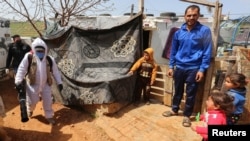No region in the world is spared from the devastating health and economic consequences of COVID-19. Among those most affected are the forcibly displaced, including more than 25 million refugees, most of whom are being sheltered in some of the world’s poorest countries.
The U.N. refugee agency (UNHCR) warns the more than 70 million people forcibly displaced by conflict and violence throughout the world are facing unprecedented hardships due to the impact of the COVID-19 pandemic.
For example, the UNHCR says it has been receiving desperate appeals for financial aid from hundreds of thousands of refugees across the Middle East and North Africa, who have been unable to work since lockdowns came into force in March.
It says more than 5.6 million Syrians who have taken refuge in neighboring countries, as well as six million people forcibly displaced within Syria are in urgent need of money, health care and necessities.
UNHCR spokesman Andrej Mahecic says an alarming number of refugees in Lebanon, Egypt, Iraq and Jordan have lost their livelihoods because of the pandemic. He says many refugees are forced to skip meals, while others are threatened with evictions because they cannot pay the rent.
“Groups at particular risk include female heads of households, unaccompanied and separated children, elderly people, LGBTI persons. Their situations can be improved through emergency assistance, notably through cash grants. Across this region, many are at risk of losing shelters and they are running out of means to support themselves,” he said.
Mahecic notes millions of Afghan refugees, including those in Iran and Pakistan, are facing a similar situation. He notes Afghanistan itself is facing the prospect of having its medical and social services overwhelmed due to the spread of COVID-19. This, as an increasing number of Afghans return home.
Elsewhere in the world, the UNHCR spokesman says the numbers of homeless and destitute Venezuelans throughout Latin America are increasing as jobs dry up because of COVID-19 lockdown measures.
“Some are now resorting to survival sex, begging or hawking on the streets. Others are at risk of being prey to smugglers and illegal armed groups. With growing fears of social unrest, xenophobia and discrimination across the region are also on the rise,” Mahecic said.
The UNHCR reports it is working to provide emergency aid, including cash-based assistance and shelter across all major refugee operations. It notes the coronavirus crisis is worsening existing dire humanitarian needs globally. It says an infusion of cash is urgently needed to support these crucial aid operations.




